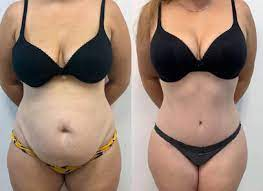Pre-operative tests are performed to assess your general health, determine your risk factors, and ensure that you are prepared to undergo surgery. The tests also help us plan your surgery, as they provide information about the amount of skin available and the amount of excess fat that can be removed.
Ensure the required blood and urine tests are done 10 days before surgery. In patients older than 45, an EKG will need to be done. Purchase the recommended compression garment or garments and check the fit before surgery. Bring these garments to the surgical center on the day of surgery.
In this post, we’ll also consider what do pre op blood tests check for and how to prepare for a pre op appointment.
Pre Op Tests Before Tummy Tuck

Many factors can cause your abdomen to become saggy. These include your age, weight changes, pregnancy, and gravity. Nobody desires to have a saggy and loose stomach because it looks aesthetically unpleasant and makes you look older. Women are particularly sensitive about the aesthetic of their abdomen. They desire to have firmer, youthful and toned tummy.
The stomach tuck, commonly referred to as abdominoplasty, is a cosmetic surgery operation that helps your abdomen regain its youthful firmness. A prominent operation involving incisions and surgical trauma is the stomach tuck. The plastic surgeon will request a variety of medical tests from you prior to the treatment to assure your safety and lower the dangers.
Why are the medical tests important?
The medical tests before the tummy tuck are essential to ensuring your safety during and after the procedure. The patient must be sure to discuss her complete health and medication history with the doctor. The tummy tuck is a highly invasive procedure and entails relatively higher risks than other cosmetic procedures.
While you may share your health and medical information with the doctor, it is essential to perform the tests to eliminate any uncertain situation that may arise. For example, if you have a history of blood clotting, it can cause problems during and after the tummy tuck. As such, the doctor will ask for tests to analyze your tendency to blood clotting.
The results of the medical tests will be used to assess your overall health and eligibility for the surgery. It will also let the doctor take immediate precautionary measures in case complications happen during or after the procedure. The patient must take the tests and ensure the surgeon has the reports before surgery day. Not doing so can lead to a delay in your tummy tuck surgery.
Medical Clearance for Tummy Tuck
Medical tests required before the tummy tuck
During the pre-operative consultation, the plastic surgeon will examine your abdomen and assess your health condition. If you are taking any medications, your doctor should know it beforehand. The surgeon may ask you to stop taking certain medicines or alter the dosage.
The plastic surgeon will recommend that you undergo particular medical tests based on the results of the consultation. Making sure you are physically prepared for a belly tuck is the aim. The kinds of tests you undergo will depend on your general state of health. You will still need to go through some testing, even if you are in good health. There will be a need for additional tests if you have health issues.
The standard tests before the tummy tuck include blood tests like blood chemistry and blood count, glucose level test, and blood clotting test. Those ladies who want to get the operation must also take a pregnancy test. Let’s discuss the required tests in detail.
Blood chemistry test
The blood chemistry test is used to assess chemical substances in the blood. The contents are released into the blood during the metabolism of specific elements. Different blood chemistry tests are used to assess different things. The blood chemistry test is performed to assess the blood’s level of chemicals including glucose, urea, and bilirubin before stomach tuck surgery. The findings will provide the surgeon with an assessment of your general health, organ functions, and electrolyte balance.
Blood and urine analysis
To detect general health problems, your plastic surgeon may ask for general blood and urine analysis tests. Usually, these tests are enough to diagnose most common health problems. If you have an infection of the urinary tract or problem in the kidney or liver, a general blood test and urine analysis will diagnose these conditions. It is also used to diagnose diabetes.
Complete blood count (CBC) is the most common test plastic surgeons ask for before the tummy tuck procedure. The test is used to diagnose conditions like anemia, infections, and blood clotting problems. It can also diagnose problems within the immune system.
Pregnancy test
For all female tummy tuck patients, a pregnancy test is required. You can’t be pregnant if you want a tummy tuck. The procedure not only poses a serious risk to your health but also poses a serious risk to the baby’s life. You should let your doctor know if you are expecting it.
Patients are advised to avoid the tummy tuck and other surgeries if they are pregnant. You should consider the operation at least six months after surgery and three months after breastfeeding.
Other tests
Your plastic surgeon may ask for additional tests, depending on your health and medical history. For example, you may be asked to do a complete blood picture test apart from liver function, blood type, hepatitis, and HIV tests.
These tests are crucial to ensuring your safety during and after surgery. It is vital for patients to do all the required tests; otherwise, the operation may be delayed. Also, during the initial consultation, be sure to discuss with the surgeon what types of tests will be required.
Are the medical tests compulsory before a tummy tuck?
Many people want to know whether the medical tests are mandatory before the tummy tuck. Some of the tests explained above are mandatory before the procedure. The necessary tests include blood, urine, and pregnancy tests at the least. However, the mandatory tests depend on your health and medical condition. If you have diabetes, heart disease, blood disorders, or hypertension, you will be required to get more compulsory tests.
In my practice, I make sure no health problem goes undiagnosed before the tummy tuck. It is essential to your safety during and after the procedure. If you are older, I may ask you for more tests. For example, in such a case, liver and heart function tests may be needed.
A tummy tuck is one of the most invasive plastic surgery procedures. It involves incisions and removal of excess skin from the abdomen, apart from tightening the abdominal wall muscles. As a result, the abdomen becomes firmer, smoother, more youthful, and toned. The surgery involves relatively more risks than other plastic surgery procedures.
Before the tummy tuck, the patient is required to get different medical tests. The tests provide an insight into your overall health, so the risks are reduced during and after surgery. The standard tests required before the surgery are explained above.
Dos And Don’ts Before Tummy Tuck
1. Creating a strong support system
Recovery from a tummy tuck typically takes 6 to 8 weeks; however, it varies from patient to patient. During this period, you’ll need the assistance of family or friends to ensure a quick and painless recovery.
Ensure your support system knows your surgery time, medication instructions, and any other crucial information regarding your after-care.
2. Follow dietary guidelines
Eat more fiber to avoid constipation and include more protein in your dishes to promote healing after your tummy tuck. Inform your surgeon about any medications or supplements you’re currently taking so they can advise you accordingly.
On the day before your tummy tuck, eat a low-fat and high-protein dinner, such as a grilled chicken salad.
3. Watch your health
Inform your surgeon if you get a fever, the flu, a cold, or a sore throat before the procedure. They can then decide if a new appointment time is required for the treatment.
4. Maintain communication with your doctor
If you have any questions about your procedure, don’t be afraid to ask your surgeon. Share with them all pertinent lifestyle and health facts as well.
5. Don’t use any form of tobacco
Smoking can significantly increase your risk of complications and can result in poor healing. So, one month before your procedure, stop smoking or consuming any other forms of tobacco.
6. Don’t drink alcohol
Alcohol causes surgery complications as it affects blood clotting and can interfere with anaesthesia. Avoid alcoholic beverages at least one week before your procedure and for several weeks after.
7. Don’t take herbal medications
Most herbal treatments, including teas and diet pills, increase bleeding. Therefore, stop taking any herbal medications prior to your procedure.
8. Wait until your surgery day to prepare for recovery
It’s normal to feel nervous and anxious before your surgery. Unfortunately, waiting until the last minute to prepare for your recovery only makes the situation worse. You’ll feel much better, less stressed, and more in control if you prepare for your recovery beforehand.
If you need more information about a tummy tuck or plastic surgery in Bristol, contact us today. We’re happy to address all your queries and concerns.
Tummy Tuck Pre Op Diet

Pre-Tummy Tuck Diet Recommendations
First of all, patients should not try to “lose a quick ten or fifteen pounds” prior to their planned tummy tuck surgery in order to get “better results”. Patients are best served by continuing with their current diets and starting to make the slow and gradual changes that will help them move towards a more “healthful” long-term diet, including:
Reducing highly refined and processed carbohydrates (chips, candies, sodas, etc.)
Adding complex, nutritious carbohydrates (fresh fruits, vegetables, grains, etc.)
Incorporating more high-quality protein sources
Incorporating high-quality dietary fats (omega-3’s, MUFA’s, PUFA’s)
Crash diets can all produce dramatic weight losses on the scales, but far too much of the weight being lost consists of the lean body tissues that are so responsible for long-term weight loss success. Extreme low carb/keto diets and low-fat diets are dead-ended metabolic traps.
What to Do Before Your Tummy Tuck
Prepare yourself for the stresses of surgery by doing the following:
Keep yourself well hydrated. The body is amazingly more efficient when hydration is optimal. Start several days prior to surgery with electrolyte replacement fluids (PowerAid, Gatorade, Pedialyte, etc.) and continue these (along with liberal water intake) for at least a full week after your procedure.
Optimize your protein stores. Proteins are crucial to wound healing and scar formation. Increase your protein intake prior to (and after) surgery by incorporating healthy high-protein snacks and high-protein shakes into your daily diet.
Optimize your energy stores. Your body’s most important metabolic fuel is glucose. Make sure your body has enough of it on board by eating enough complex carbohydrates prior to surgery. (Now is not the time to deplete your glucose/glycogen stores by living the keto life).
Shift your body to an anti-inflammatory state. Inflammation is the enemy of healing and optimal scar formation. Reduce the intake of pro-inflammatory foods (refined carbohydrates, omega-6 and saturated fatty acids, etc.) and increase the intake of anti-inflammatory foods rich in antioxidants (fresh fruits and vegetables, omega-3 fatty acids, etc.).
Maximize your GI health (which can be disturbed post-operatively by prescribed antibiotics) with probiotics. These can be in the form of yogurts with active cultures (Activa, et al.), active culture drinks (Kombucha, Kefir, et al.), or supplements (1MD Complete Probiotics Platinum, et al.).
A recommended schedule for incorporating these dietary changes before and after surgery can be found below.

Post-Tummy Tuck Diet Plan Recommendations
After the tummy tuck, you should advance your diet slowly and carefully as tolerated. Drink water, Ginger Ale (that has been allowed to go flat), and electrolyte replacement drinks to maintain adequate hydration. In terms of solid foods, start with bland crackers (saltines, Belvita, et al.) and then advance to more substantial intake as tolerated.
If postoperative oral antibiotics have been prescribed, it is especially important to maintain gut health with probiotics, so start these as soon as possible. They can help re-establish populations of healthy bacteria and yeasts within the GI tract for proper digestion and absorption.
Finally, get up and moving as soon as possible following Abdominoplasty. Regardless of how much protein is being taken in via the diet, muscle wasting can be significant with immobility (total inactivity can lead to a 10-20% decrease in muscle strength over the course of just a week). Furthermore, early mobilization is essential to preventing the development of potentially dangerous blood clots in the legs.
Long-Term Recommendations
Abdominoplasty surgery is not a substitute for a healthy diet and exercise. Conversely, diet and exercise alone often cannot correct the mechanical problems (separated muscles, stretched out skin, deposits of hormonal/diet-resistant fat cells) that are so bothersome to the patient after pregnancy or after significant weight loss. In fact, the two often work synergistically with one another, not exclusively with one another.
Eating a “healthier” diet can mean many things. In broad generalities, however, it most often means:
- Eating better quality complex carbohydrates (more fresh fruits and vegetables, whole grains, etc.) and less refined carbohydrates (chips, candies, sodas, processed foods, etc.).
- Eating better quality fats rich in omega-3 fatty acids (olive oils, salmon, walnuts, soybeans, etc.)
- Eating more high-quality proteins (fish, poultry, lean meats, dairy products, nuts and seeds, lentils and beans, etc.).
- Eating only the quantity of calories that you actually need.
For the majority of patients, learning about the so-called Mediterranean Diet, which is actually more of a way of life than a diet, would be a terrific place to start. Regardless of whether they like it or not, this does not imply that one must learn to consume hummus. It implies that foods that have undergone extensive processing and refinement will be replaced by healthful, fresh foods that don’t come from a bag, box, or drive-through window. It implies that serving sizes will be lower but more filling. It all comes down to improving nutritional quality while reducing calorie intake.
Get ready for your surgery by starting to eat smarter and healthier. Implement these diet guidelines before and after your tummy tuck procedure to ensure a sustained lifestyle that can help you get the most out of your abdominoplasty procedure!
What Do Pre Op Blood Tests Check For
Your surgeon may tell you that you need some tests before surgery. Some tests are for all surgical patients. Others are done only if you are at risk for certain health conditions.
Common tests that your surgeon may ask you to have if you have not had them recently are:
- Blood tests such as a complete blood count (CBC) and kidney, liver, and blood sugar tests
- Chest x-ray to check your lungs
- ECG (electrocardiogram) to check your heart
How To Prepare For A Pre Op Appointment
- Review your medication list, with recommendations for how to take your medications prior to surgery.
- Review your medical, surgical and family history.
- Include a physical exam.
- If necessary, complete additional preoperative testing following your exam, including blood tests, urine tests, X-rays or an EKG.

